Genetically modified (GM) foods contain at least one ingredient coming from a plant with an altered genetic composition.16 Genetic modification, also known as genetic engineering, often introduces new, desirable characteristics to plants, such as greater resistance to pests. Many U.S. crops are grown using genetically engineered seeds, including a large share of the soybean, corn, cotton and canola crop. As a result, the majority of processed foods in the U.S. contain at least one genetically modified ingredient.
Despite the growing use of genetically modified crops over the past 20 years, most Americans say they know only a little about GM foods. And many people appear to hold “soft” views about the health effects of GM foods, saying they are not sure about whether such foods are better or worse for one’s health. When asked which of three positions best fits their viewpoints, about half of Americans (48%) say the health effects of GM foods are no different than other foods, 39% say GM foods are worse for one’s health and one-in-ten (10%) say such foods are better for one’s health.
About one-in-six (16%) Americans care a great deal about the issue of GM foods. These more deeply concerned Americans predominantly believe GM foods pose health risks. A majority of this group also believe GM foods are very likely to bring problems for the environment along with health problems for the population as a whole.
While a 2016 report from the National Academies of Sciences, Engineering and Medicine suggests there is scientific consensus that GM foods are safe, a majority of Americans perceive disagreement in the scientific community over whether or not GM foods are safe to eat. And, only a minority of Americans perceive scientists as having a strong understanding of the health risks and benefits of GM foods.
Perhaps some of this skepticism comes from people’s concerns about the motives of research scientists. Some three-in-ten Americans say that research findings about GM foods are often influenced by the researchers’ desires to help their industries. And people deeply concerned about this issue are particularly skeptical about the influence of industries behind research findings. A minority of three-in-ten Americans say that research findings from scientists about GM foods are often influenced by the best available evidence. People who know more about science topics, generally, are more likely to trust information from scientists and see scientific research findings about GM foods in a more favorable light.
Public awareness of genetically modified foods runs the gamut
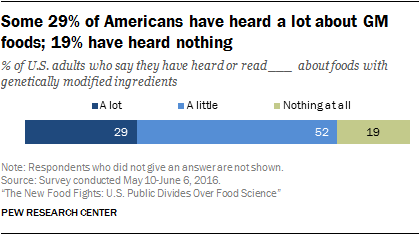
Foods with genetically modified ingredients have been available to Americans since about the mid-1990s when U.S. farmers began using genetically engineered crop varieties designed to better tolerate herbicides and resist pests.17 Today, many processed foods in the United States contain ingredients that are genetically modified. More than 90% of the soybeans, corn, cotton and canola grown in the United States come from genetically engineered seeds. Genetically engineered ingredients are widely used in processed foods from breakfast cereals to cooking oils to corn chips.
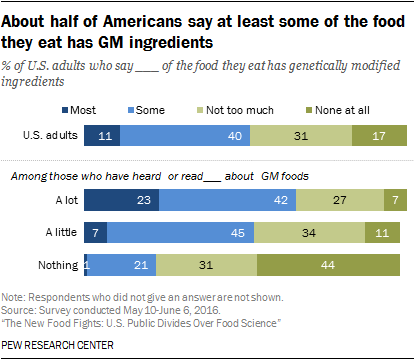
Most Americans have heard something about GM foods; 29% have heard “a lot,” roughly half (52%) have heard “a little.” About one-in-five (19%) Americans have heard “nothing at all” about GM foods.
People’s perceptions of how much GM food they eat is often seen as a benchmark for the public’s familiarity with GM foods. The argument goes that people who see themselves as not eating GM foods must be largely unaware that much of today’s food supply contains at least some GM ingredients, particularly foods using genetically modified corn or corn oil.
Overall, just 11% of Americans estimate that most of the food they eat has GM ingredients, another four-in-ten (40%) say some of the food they eat has GM ingredients. About half of the public (48%) says they do not eat GM foods or do so not too much.
Familiarity with GM foods is linked with people’s perceptions of their own consumptions. Some 23% of those who say they have heard or read a lot about GM foods say that most of what they eat contains genetically modified ingredients. Another 42% of this group says they eat some GM foods. Just 1% of those who say they have heard nothing about GM foods estimate that most of the food they eat contains genetically modified ingredients.

About half of Americans see no difference between GM and other foods, while a sizable minority say GM foods are a health risk
A number of observers have suggested that Americans’ limited familiarity with genetically modified foods suggests that people’s opinions about GM are “soft” and, therefore, more likely to change over time and, potentially, to be sensitive to differences in survey question wording.
The Pew Research Center survey explored this possibility by first asking about the safety of eating of GM foods with an explicit option for those not sure of their opinions to register that uncertainty. Roughly a quarter of adults (26%) said they were not sure of their views on this topic. A follow up question among the unsure asked for their “leaning” about whether GM foods were generally better for one’s health, worse, or neither. Some 58% of this group opted for a neutral position that GM foods were neither better nor worse for one’s health than foods without GM ingredients.
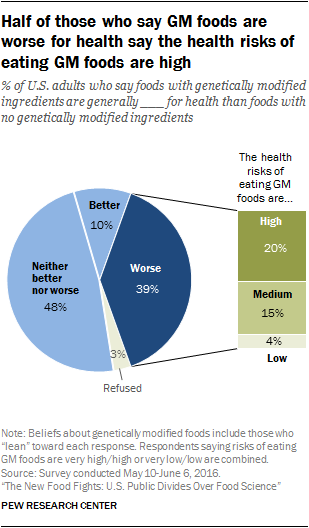
Overall, some 39% of Americans say that GM foods are worse for one’s health after combining the responses to the first question with “leaning” views on the second question. About half (48%) of Americans say GM foods are neither better nor worse for one’s health than other foods, and a minority of 10% say that GM foods are better for one’s health.
The Pew Research Center survey asked respondents who say foods with GM ingredients are worse for one’s health to evaluate the magnitude of the risk of eating GM foods. More Americans consider the risk either medium (15% of all U.S. adults) or high (20% of all U.S. adults) than consider the health threat of GM foods to be low (just 4% of all U.S. adults).
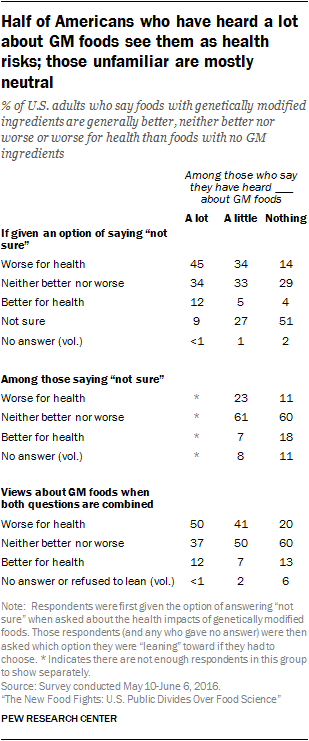
People who have heard or read more about GM foods are much more likely to consider these foods worse for one’s health. Those who are less familiar with GM foods are comparatively more inclined to say the effect of GM foods is neither better nor worse than non-GM foods. For example, about half (50%) of those who have heard or read a lot about GM foods say such foods are worse for one’s health. By contrast, just two-in-ten (20%) of those who have heard nothing about GM foods consider these foods worse for one’s health. Six-in-ten of those who have heard nothing about GM foods prior to taking the survey say such foods are neither better nor worse for one’s health.
People who have heard or read a lot about GM foods are also much more likely to say the health risks from genetically modified foods are high (31% vs. 9%).
Younger adults and those more concerned about the issue say GM foods are a health risk
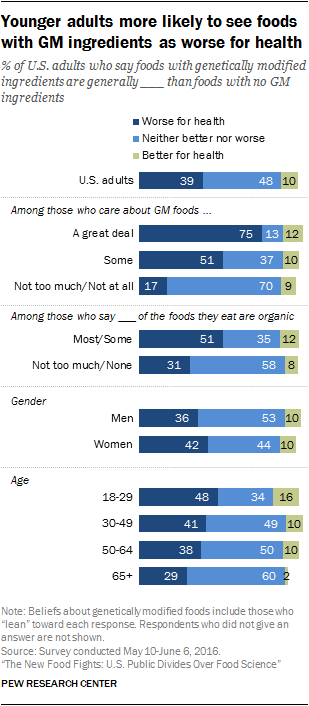
People’s views about the health effects of GM foods tend to vary with their own levels of concern about the issue as well as with age.
Three-quarters of people who care a great deal about the issue of GM foods say such foods are worse for one’s health than foods without GM ingredients. By contrast, only 17% of those who do not care at all or not too much about this issue say that GM foods are health risks. Those who care “some” about this issue fall in between with 51% of this group saying that GM foods are worse for one’s health.
Younger adults are more likely than their elders to consider GM foods health risks. About half (48%) of those ages 18 to 29 say GM foods are worse for one’s health than non-GM foods. In comparison, roughly three-in-ten (29%) of those ages 65 and older say the same.
There are modest differences in views by gender. Women are more likely to say foods with GM ingredients are worse for one’s health (42% vs. 36%), while men are more inclined to say foods with GM ingredients are neither better nor worse for health (53% vs. 44%). A 2014 Pew Research Center survey also found women were more likely than men to say it is generally unsafe to eat GM foods.
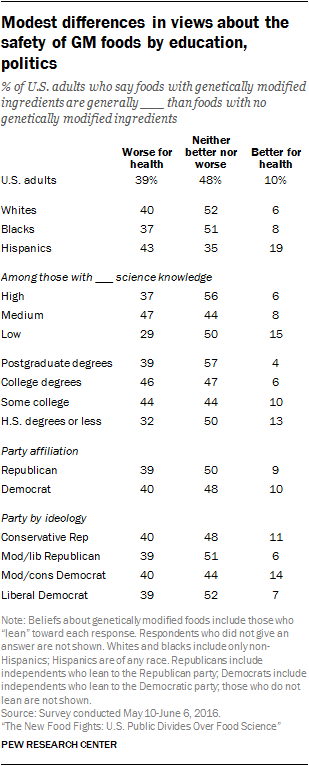
Frequent consumers of organic foods are also relatively more inclined to see GM foods as worse for one’s health. But people who are focused on eating healthy and nutritious are about equally likely as those with little or no focus on this to say that GM foods are worse for one’s health than other foods.
Other factors – including people’s education and general level of science knowledge –are only modestly linked with beliefs about the health effects of GM foods. While a related Pew Research Center report found issues related to climate and energy issues are strongly divided along political lines, Democrats and Republicans hold similar views on the effects of eating GM foods.
Who is particularly concerned about the issue of genetically modified foods?
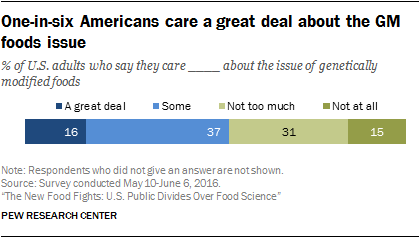
One-in-six (16%) U.S. adults say they care a great deal about the issue of GM foods. Some 37% care some about this issue. About three-in-ten Americans do not care too much (31%) and 15% do not care at all about the GM foods issue.
Those who care a great deal about the GM foods issue are also more likely to follow news on this topic. Some 68% of those who are engaged with this issue follow news on the topic very or somewhat closely. In contrast, only about one-quarter of other Americans follow news on GM foods somewhat or very closely.
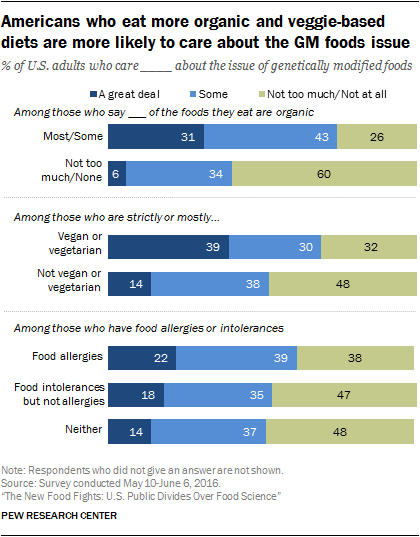
Those who care a great deal about this issue are more likely to report greater awareness about the topic. Some 68% of those who care deeply about this issue say they have heard or read a lot about GM foods. In contrast, 28% of those who care some and just 15% of those do not care at all or not too much about this issue say they have heard or read a lot about GM foods.
Americans’ eating choices tend to be linked with their degree of concern about the issue of GM foods.
About three-in-ten (31%) frequent consumers of organic foods care a great deal about the GM foods issue, compared with just 6% among those who eat little organic foods.
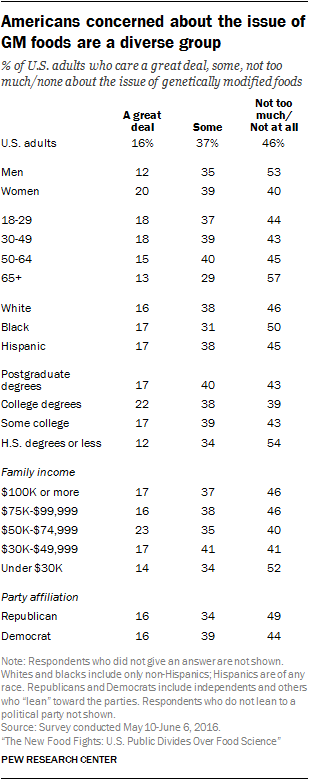
Vegans/vegetarians are more likely to care about the issue of GM foods; 39% of people who are at least mostly vegan or vegetarian care a great deal about this issue.
People with food allergies are slightly more inclined to care about the issue of GM foods (22% care a great deal compared with 14% among those with no allergies or intolerances to food).
Women are more likely to care a great deal about the GM foods issue than men (20% vs. 12%).
There are only modest differences in concern about this issue by other demographic and educational groups. Older adults, ages 65 and older, are a bit less likely than their younger counterparts to care deeply about the issue of GM foods. Those with high school degrees or less are a bit less likely than other educational groups to care about the issue of GM foods. And those with family incomes under $30,000 annually have a bit less concern about this issue than those with higher incomes.
There are no differences by political party in people’s degree of concern about the issue of GM foods.
Public expectations about the effects of GM foods are mixed; some worry that GMOs will affect environment as well as public health
Americans have mixed expectations about the likely effects from genetically modified foods, with many expressing both optimism and pessimism about consequences of GM foods.
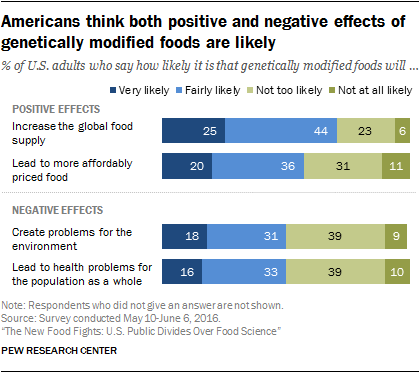
Most of the public expects GM foods to increase the global food supply. One-quarter say this is very likely and an additional 44% say this is fairly likely. A somewhat smaller majority says GM foods are very (20%) or fairly likely (36%) to result in more affordably priced foods.
At the same time, about half of Americans say environment and health problems will result from GM foods. Some 18% say it is very likely and 31% say it is fairly likely that GM foods will create problems for the environment. And similar shares say it is very (16%) or fairly likely (33%) that GM foods will lead to health problems for the population as a whole.
People who are most concerned about the GM foods issue are far more likely to foresee environmental and health problems because of these foods
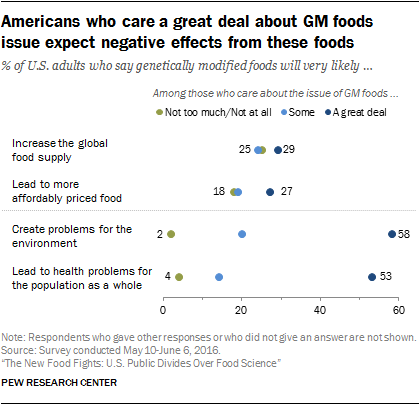
People who are more personally concerned about the issue of GM foods are especially worried that such foods will lead to health and environmental problems for society. Some 58% of those with deep personal concern about the GM foods issue say it is very likely that these foods will lead to problems for the environment; a similar share (53%) expects GM foods to result in health problems for the population as a whole. In contrast, majorities of those who are less engaged with this issue say environmental and health problems stemming from GM foods are not too or not at all likely.
These expectations of risks for society from GM foods are in keeping with the wide differences among these groups in their views of the health risks associated with eating GM foods.
More men expect positive effects from GM foods; more women expect negative effects
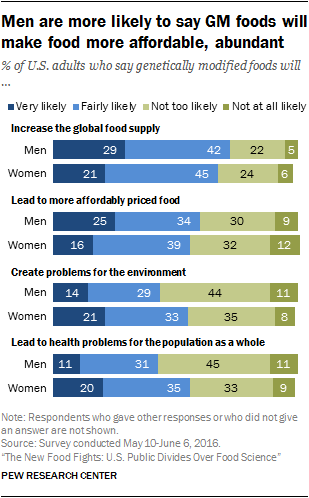
Men and women have somewhat different expectations for GM foods. Men are more optimistic, while women are more pessimistic about the likely impact of GM foods on society.
Men are more inclined than women to expect GM foods to increase the global food supply (29% of men vs. 21% of women who say this is very likely). Similarly men are more likely than women to say that GM foods will lead to lower food costs (25% vs. 16% who say this is very likely). But, women are more likely than men to think GM foods will create problems for the environment (21% of women vs. 14% of men who say this is very likely) and to bring health problems for the population as a whole (20% of women vs. 11% of men who say this is very likely).
These modest differences in expectations by gender are in keeping with other studies. For example, a 2016 Pew Research Center study found women are more wary than men of emerging biomedical technologies to enhance human abilities, and a 2014 survey found women less likely to expect future technological changes, in general, to make people’s lives better.
There are modest generational differences in expected effects from GM foods. Adults ages 65 and older are less pessimistic than their younger counterparts about the likely effects of GM foods for society; more adults ages 65 and older say harm to the environment or to public health from GM foods is not at all or not too likely to occur. But younger adults, especially those ages 18 to 29, are more likely to think that GMOs will result in more affordably priced foods.
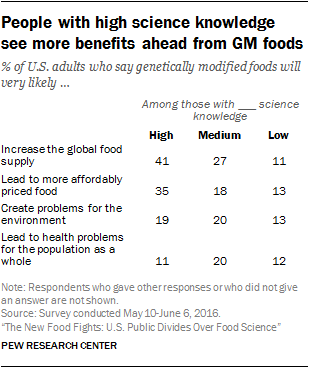
Those with high science knowledge are more optimistic in their expectations that GM foods will bring benefits to society. Roughly four-in-ten (41%) of those with high science knowledge say it is very likely that GM foods will increase the global food supply. And 35% of those with high science knowledge say it is very likely GM foods will lead to more affordably priced foods. In comparison, just 11% of those low in science knowledge say GM foods are very likely to increase the global food supply and 13% say GM foods are very likely to bring more affordably priced food.
Education, which is closely linked with levels of science knowledge, shows a similar pattern. Postgraduate degree-holders are more inclined to say GM foods are very likely to increase the global food supply and to lead to more affordably priced food than those with less education.
Americans hold mixed views of scientists and the research connected with GM foods
Public views of scientists and their understanding about the health risks and benefits of GM foods are mixed and, often, skeptical. Most Americans perceive considerable disagreement among scientific experts about whether or not GM foods are safe to eat. While most people trust scientists more than they trust each of several other groups to give full and accurate information about the health effects of GM foods, only a minority of the public says they have a lot of trust in scientists to do this. At the same time, most Americans say that scientists should have a major role in policy decisions about GM foods, but so, too, should small farm owners and the general public. Fewer Americans say that food industry leaders should play a major role at the policy-making table.
But views of scientists connected with GM foods are often similar among those who with deep personal concern about the issue of GM foods and those with less concern. Differences are more pronounced between these groups when it comes to views of industry influence on scientific research findings and trust in food industry leaders to give full and accurate information about the health effects of GM foods. In other respects, people with deeper concern about this issue vary only modestly from other Americans in their views of scientists and the scientific research on GM foods.
People who tend to know more about science topics, in general, tend to have more positive views of scientists’ understanding and see the influences on their research findings about the health effects of GM foods in a positive light.
Relatively few Americans perceive broad scientific consensus on safety of GM foods
A recent report from the National Academies of Sciences, Engineering and Medicine concluded there was no persuasive evidence that genetically engineered crops have caused health or environmental problems.18 Other reviews of the scientific literature have found almost all researchers working on this topic think GM foods are as safe as non-GM foods.19 Similarly, a 2014 Pew Research Center survey found 88% of members of the American Association for the Advancement of Science (AAAS) and 92% of working Ph.D. biomedical scientists said it is safe to eat genetically modified foods.
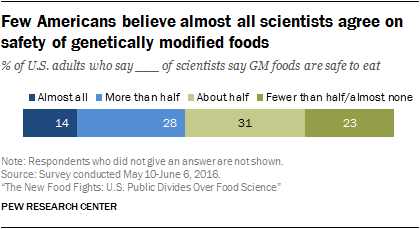
But in the public’s view, scientists appear divided over the safety of GM foods. Only a small minority (14%) of Americans say almost all scientists agree that GM foods are safe. Another 28% say more than half of scientists say that GM foods are safe. But 53% of U.S. adults say that half or fewer scientists agree that GM foods are safe to eat.
People’s own views about the safety of foods with GM ingredients are closely related to their perceptions of scientific consensus. For example, those who view GM foods as worse for health are especially inclined to say that there is little agreement among scientists about the safety of GM foods. Past Pew Research Center studies have found a similar pattern when it comes to perceptions of scientific consensus and beliefs about climate change as well as beliefs about evolution.
Across all levels of concern about this issue, few see broad consensus among scientists that GM foods are safe to eat. Those who care a great deal about this issue are a bit more likely to see majority consensus among scientists (50% compared with 37% of those who care some and 43% of those who care not too much or not at all about the GM foods issue).
Similarly, people who have heard or read a lot about GM foods are far more likely than those who have heard or read nothing about this issue to see consensus among scientists that GM foods are safe.
A minority of Americans say scientists understand the health effects of GM foods very well
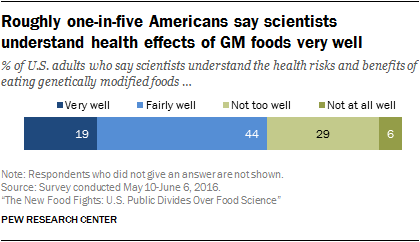
Most of the public has at least some reservations about scientists’ understanding of the health effects of GM foods. Only 19% of Americans say scientists understand the health risks and benefits of eating GM foods very well, while an additional 44% say scientists understand this fairly well. About one-third of Americans say scientists understand the risks and benefits of eating GM foods not too well or not at all well. For comparison, in a 2014 Pew Research Center survey two-thirds (67%) of U.S. adults said that scientists generally do not have a clear understanding of the health effects of GM crops.
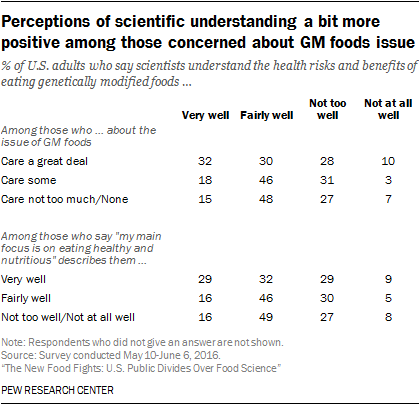
Those who perceive broad scientific consensus on the safety of GM foods are more likely to think scientists understand this topic. Some 45% of those who think almost all scientists agree that GM foods are safe to eat also say scientists understand this topic very well.
Paradoxically, people who are care a great deal about the issue of GM foods tend to say that scientists understand the health risks and benefits of eating GM foods very well (32%). By comparison, fewer people who do not care at all or not too much about this issue give scientists high marks for their understanding of the health effects of GM foods. Although, roughly similar shares of each group say that scientists understand the effects of GM foods at least fairly well. A similar pattern occurs among those focused on eating healthy and nutritious; more among this group (29%) say that scientists understand the effects of GM foods very well, compared with 16% of those who are less focused on healthy eating.
As noted above, those who care a great deal about the issue of GM foods are also a bit more likely than others to see scientists as agreeing that GM foods are generally safe to eat.
Americans are most trusting of scientists, small farm owners for information about the effects of GM foods
Americans are, comparatively speaking, more trusting of information from scientists and small farm owners on the safety of GM foods than they are of information from food industry leaders, the news media or elected officials.
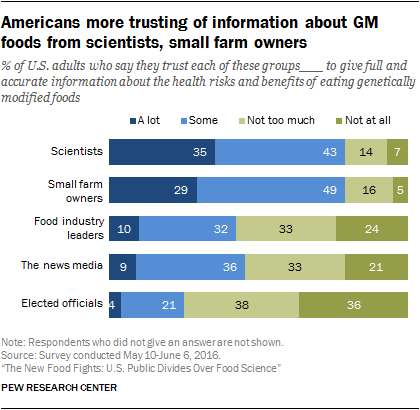
In absolute terms, however, Americans are somewhat skeptical of information from scientists. A minority of 35% say they trust scientists a lot to give full and accurate information about the health effects of eating GM foods. About one-in-five say they do not trust information from scientists at all or not too much. Another 43% of U.S. adults report some trust in scientists’ information.
A similar share of Americans trust small farm owners a lot (29%) or some (49%) to give full and accurate information about the health effects of GM foods. Public trust in information on the effects of GM foods from the news media, food industry leaders and elected officials is much lower. No more than one-in-ten Americans trust each of these groups a lot; majorities say they have no trust or not too much trust in the news media, food industry leaders and elected officials to give full and accurate information about the health effects of GM foods.
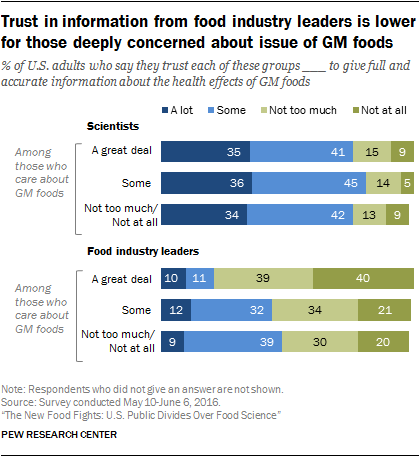
Those who have heard or read a lot about GM foods are more likely to trust scientists (44% of this group say they trust scientists a lot, compared with 20% among those who say they have heard or read nothing about GM foods.) People who care more deeply about this issue express a similar level of trust in scientists as those with less concern about the issue of GM foods.
However, people deeply concerned about the issue of GM foods are especially skeptical of information from food industry leaders. Just 21% of those deeply concerned about this issue trust food industry leaders at least some to provide full and accurate information about the effects of GM foods, compared with 48% among those who do not care about the issue of GM foods at all or not too much. Fully half of those who care deeply about the issue of GM foods (50%) say that scientific findings about GM foods are influenced by the researchers’ desires to help their industries “most of the time.” In contrast, 22% of those with little concern about the issue of GM foods say the same.
Three-in-ten Americans say research on GM foods is often influenced by the best available evidence; a similar share says other motivations influence researchers
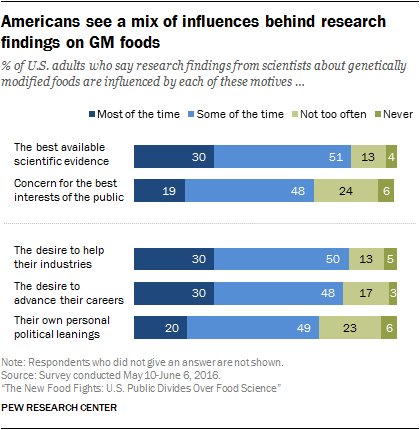
The public offers a mixed assessment of what influences research from scientists on GM foods. Many Americans are skeptical that the best available evidence commonly influences research findings on GM foods. Three-in-ten Americans say research findings are influenced by the best available evidence most of the time, about half (51%) say this occurs some of the time and 17% say the best available evidence rarely or never influences research findings about GM foods.
At the same time, three-in-ten Americans (30%) say desires of scientists to help their industries influence the research findings on GM foods most of the time. Half (50%) say this occurs some of the time.
Perceptions that researchers’ career interests influence the research findings are similar; 30% say such motivations influence the research most of the time and 48% say this occurs some of the time.
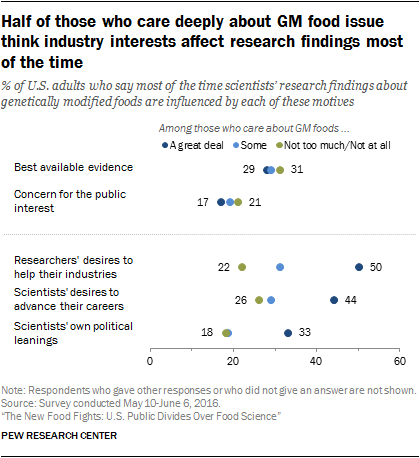
People more engaged in the issue of GM foods are particularly skeptical about the possibility of industry influence on scientific research findings. Half (50%) of those who care a great deal about the GM foods issue say researchers’ desires to help their industries influence research on GM foods most of the time. Those less engaged in the issue of GM foods are much less inclined to say that industry interests often influence science research.
People with a deeper personal concern about the issue of GM foods are similarly more inclined than other Americans to say that scientists’ desires for career advancements or their own political leanings often influence their research findings about GM foods.
But level of concern about the issue of GM foods is unrelated to views that the best available evidence influences scientists’ research findings. A minority of 29% of those who care a great deal about this issue says the best evidence influences research findings about GM foods most of the time, as do similar shares of those with less concern about the GM foods issue.
People with higher science knowledge tend to hold more positive views of scientists and their research findings on GM foods
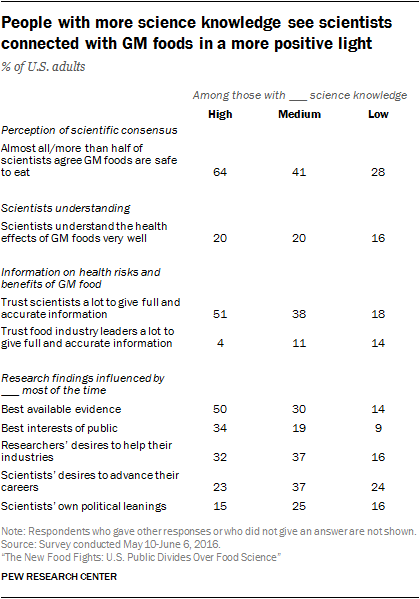
Although there only modest differences in perceptions of risk from eating GM foods among people with high, medium or low levels of science knowledge, those with higher science knowledge tend to assess scientists and their research on GM foods more favorably than those with less knowledge.
Those high in science knowledge, based on a nine-item index, are more likely to see scientists as being in agreement that GM foods are safe; 64% of those with high science knowledge say that almost all/more than half of scientists agree about this, compared with 28% of those with low science knowledge.
Americans with high science knowledge are especially trusting of information from scientists on the effects of eating GM foods. Roughly half of those with high science knowledge (51%) trust information from scientists a lot, while only about one-in five (18%) of those with low science knowledge say the same.
People with high science knowledge are also more inclined to think that research on GM foods reflects the best available evidence most of the time (50% of those with high science knowledge say this, compared with 14% of those with low science knowledge).
Like other Americans, those with high science knowledge have low trust in information from food industry leaders to give full and accurate information about the effects of GM foods. And, those with high (32%) and medium (37%) science knowledge say that researchers’ desires to help industries they work with or work for influence research findings most of the time. This compares with 16% among adults with low science knowledge.
Most Americans say scientists should have a role in policymaking on GM foods
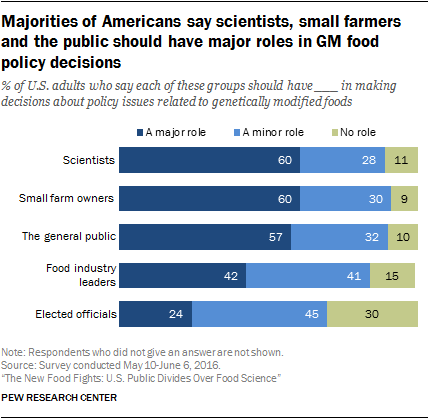
Despite some skepticism among the public about scientists working on GM foods, most of the public wants scientists to have a seat at the policymaking table. Six-in-ten U.S. adults (60%) say scientists should have a major role in GM policy decisions and 28% say scientists should have a minor role. Just 11% think scientists should have no role in policy decisions.
Majorities also support major roles for small farmers and the general public in policy decisions related to GM foods. Six-in-ten (60%) Americans say small farmers should have a major role in policy decisions about GM foods and a similar share, 57%, says the general public should have a major role. Fewer Americans say that food industry leaders should have a major role in policy decisions related to GM foods (42%). Americans are least inclined to say elected officials should have a major role in GM food policy (24%); 45% say elected officials should have a minor role and 30% say they should have no role in policy decisions about GM foods.
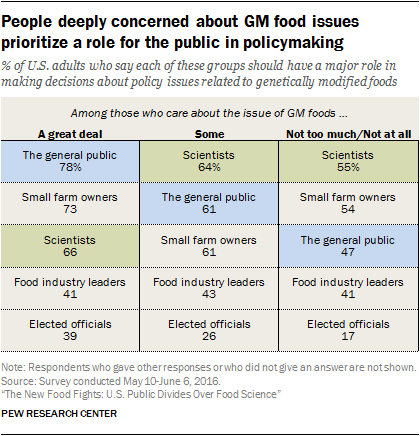
People who are deeply concerned about the issue of GM foods give higher priority to the general public in policy decisions. Fully 78% among this group say the general public should have a major role in policy decisions. A smaller majority says scientists should have a major role in GM food policy (66%). By comparison, people who are not at all concerned or not too concerned about the issue of GM foods give higher priority to scientists in influencing policy decisions.
Assessments of media coverage on GM foods vary with degree of concern about the issue
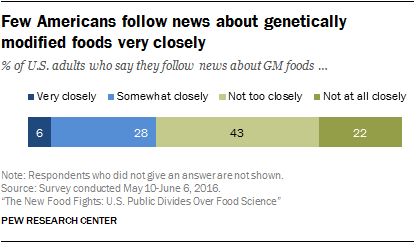
Few Americans follow news about GM foods closely; just 6% of Americans say they follow news about GM foods very closely. Some 65% do not follow news about GM foods at all or not too closely, and another 28% say they follow such news somewhat closely.
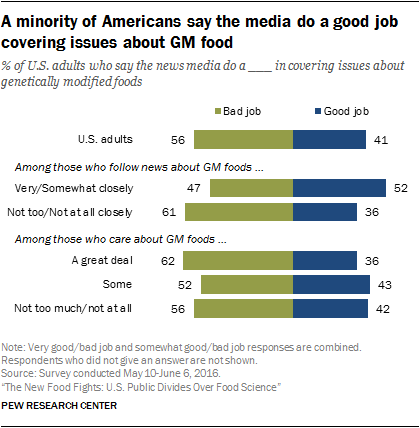
Overall, more Americans give negative than positive assessments of how the media cover GM foods. Some 56% of Americans say the news media are doing a very or somewhat bad job, while 41% say the news media are doing a very or somewhat good job.
People who follow news about GM foods very or somewhat closely are more divided in their assessments of news coverage on GM foods (52% say the news media do a good job and 47% say the news media do a bad job).
Ratings of media coverage of GM foods is roughly similar among those with higher and lower concern about the issue of GM foods.
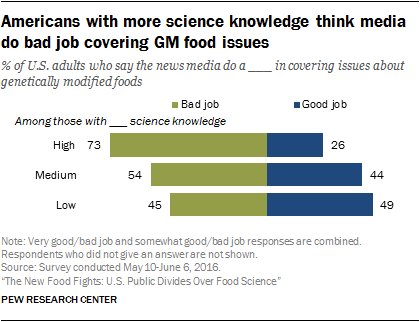
Americans with more science knowledge are especially critical of media coverage on GM foods. Some 73% of those with high science knowledge say the news media do a bad job, while only about one-quarter (26%) say the news media do a good job covering GM food issues. By comparison, those with low science knowledge are closely split in their views of media coverage on these issues; 49% say the media do a good job, 45% say they do a bad job covering these issues.
The Pew Research Center survey also included two additional questions exploring people’s views about the balance of news coverage on GM foods.
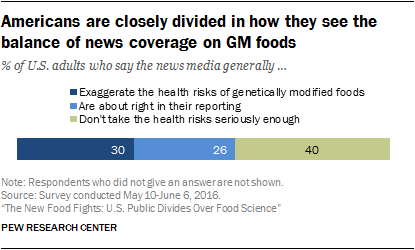
Overall, four-in-ten Americans (40%) say the news media do not take the health risks of GM foods seriously enough. A slightly smaller share (30%) thinks the news media exaggerate the health risks of GM foods. Roughly one-quarter (26%) say the news media are about right in their reporting.
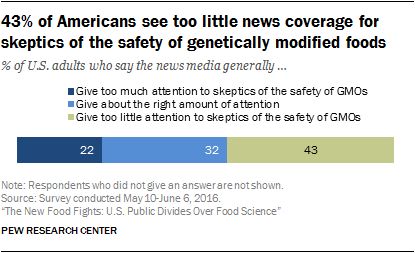
Further, 43% of U.S. adults say the news media give skeptics of the safety of GMOs too little attention. A smaller share (22%) says the news media give too much attention to skeptics. About one-third (32%) say the news media give skeptics of the safety of GMOs about the right amount of attention.
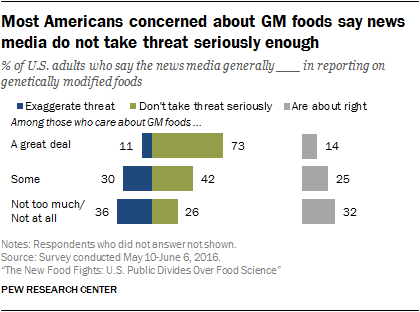
People’s level of concern with the issue of GM foods is closely related to their views about media coverage. Fully 73% of those who care a great deal about the issue of GM foods say the news media do not take the health threat from GMOs seriously enough. Those with little personal concern about this issue are roughly equally divided between whether the news media exaggerate the health threat, do not take the health threat seriously enough or are about right in their reporting.
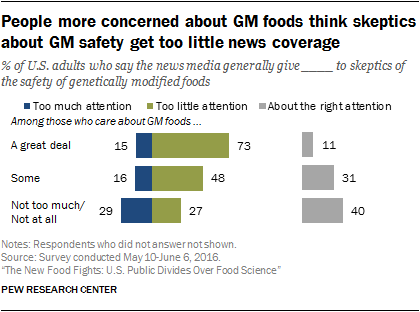
Views about media attention given to skeptics of the safety of GMOs follow a similar pattern. Some 73% of those who care a great deal about the issue of GM foods say the news media give too little attention to the skeptics of the safety of GMOs. In contrast, among those with no or not too much personal concern about the GM food issue, 27% say the news media give skeptics of the safety of GMOs too little attention.




